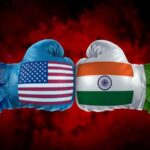Indian representative decries humanitarian crisis amidst starvation deaths; UNSC statement may signal another shift in India’s position
Raising concerns over the ongoing “humanitarian crisis” in Gaza at the United Nations Security Council, India said that a ceasefire is a “must”, as is the release of all hostages. India’s support to the Palestinian cause is “unwavering”, added Parvathaneni Harish, India’s Permanent Representative to the United Nations.
Watch | India calls for ceasefire in Gaza, says intermittent pauses ‘not enough’
Mr. Harish’s statement was delivered during the UNSC’s quarterly open debate on the ‘Situation in the Middle East, including the Palestinian question’ on Wednesday. It comes just a month after India abstained on a resolution at the UN General Assembly that called on Israel to implement an immediate ceasefire. The debate was convened by Pakistan, which holds the Security Council Presidency for July, and was chaired by Pakistan’s Foreign Minister Ishaq Dar.
“Intermittent pauses in hostilities are not enough to address the scale of humanitarian challenges confronting the people, who grapple daily with acute shortages of food and fuel, inadequate medical services and lack of access to education,” Mr. Harish said during his intervention, citing UN and WHO estimates that 95% of all hospitals in Gaza are damaged or destroyed, and that more than 6,50,000 children have had no schooling for over 20 months.
Changing position
“A ceasefire must be put in place. All hostages must be released. Dialogue and diplomacy remain the only viable paths to achieving these objectives. There are no other fixes or solutions,” he added.
The MEA did not respond to a request for comment on why India’s position appears to have shifted over the past month, with a stronger statement on the need for a ceasefire than before. In the UNGA vote on June 12, India was one of only 19 abstentions, while 12 countries voted against a resolution pressing Israel for an immediate ceasefire. In all, 149 countries voted for the resolution, while the Indian representative said only that releasing hostages and a ceasefire were “important to ameliorate the humanitarian situation in Gaza”.
Deteriorating situation
Over the past month, talks between Israel and Hamas through a number of interlocutors have failed to produce a ceasefire, and the humanitarian situation has further deteriorated over Israel’s restrictions on food aid into the Gaza Strip. Israeli Defence Forces have been accused of firing at Palestinians attempting to take food at aid checkpoints manned by security forces. The United Nations Office of the High Commissioner for Human Rights has estimated that 875 people have been killed in recent weeks while trying to get food, of which 674 were killed in the vicinity of sites run by the Gaza Humanitarian Foundation, a U.S. NGO supported by Israel.
Since the October 7 terror attacks, Israel’s bombardment and operations in Gaza have left about 62,000 dead, and UNICEF estimates that at least 50,000 children have been killed or injured.
Reports of malnourishment and starvation in the camps in Gaza prompted a strong statement this week from 30 countries, including European countries, the U.K., Canada, and Australia. They “condemned” Israel’s denial of “essential humanitarian assistance” to civilians, while a number of international human rights agencies have formally accused Israel of perpetrating a “genocide”.
‘Historic ties to Palestinians’
At the UNSC debate, where India was a special invitee, Mr. Harish also reiterated India’s position that a “two-state” solution was the only “pathway to enduring peace” between Israel and Palestine.
“India shares historic and strong ties with our Palestinian brothers and sisters. We have always stood by them and our commitment towards the Palestinian cause is unwavering,” he said. India hopes that the High-Level International Conference on the implementation of a two-State solution, scheduled next week at the UN and convened by France and Saudi Arabia, will pave the way for “concrete steps towards achieving a two-State solution”, Mr. Harish said.
It is unclear whether India’s statement on Wednesday indicates a more permanent shift in its position on the issue. Since 2023, India has voted in favour of resolutions calling for immediate ceasefires at various points including in December 2024, but has also abstained from some resolutions that are critical of Israel’s actions or have not adequately condemned the October 7 attacks.
At UNSC, India says Gaza ceasefire is a ‘must’, reaffirms support to Palestinian ‘brothers and sisters’
Indian representative decries humanitarian crisis amidst starvation deaths; UNSC statement may signal another shift in India’s position
Raising concerns over the ongoing “humanitarian crisis” in Gaza at the United Nations Security Council, India said that a ceasefire is a “must”, as is the release of all hostages. India’s support to the Palestinian cause is “unwavering”, added Parvathaneni Harish, India’s Permanent Representative to the United Nations.
Watch | India calls for ceasefire in Gaza, says intermittent pauses ‘not enough’
Mr. Harish’s statement was delivered during the UNSC’s quarterly open debate on the ‘Situation in the Middle East, including the Palestinian question’ on Wednesday. It comes just a month after India abstained on a resolution at the UN General Assembly that called on Israel to implement an immediate ceasefire. The debate was convened by Pakistan, which holds the Security Council Presidency for July, and was chaired by Pakistan’s Foreign Minister Ishaq Dar.
“Intermittent pauses in hostilities are not enough to address the scale of humanitarian challenges confronting the people, who grapple daily with acute shortages of food and fuel, inadequate medical services and lack of access to education,” Mr. Harish said during his intervention, citing UN and WHO estimates that 95% of all hospitals in Gaza are damaged or destroyed, and that more than 6,50,000 children have had no schooling for over 20 months.
Changing position
“A ceasefire must be put in place. All hostages must be released. Dialogue and diplomacy remain the only viable paths to achieving these objectives. There are no other fixes or solutions,” he added.
The MEA did not respond to a request for comment on why India’s position appears to have shifted over the past month, with a stronger statement on the need for a ceasefire than before. In the UNGA vote on June 12, India was one of only 19 abstentions, while 12 countries voted against a resolution pressing Israel for an immediate ceasefire. In all, 149 countries voted for the resolution, while the Indian representative said only that releasing hostages and a ceasefire were “important to ameliorate the humanitarian situation in Gaza”.
Deteriorating situation
Over the past month, talks between Israel and Hamas through a number of interlocutors have failed to produce a ceasefire, and the humanitarian situation has further deteriorated over Israel’s restrictions on food aid into the Gaza Strip. Israeli Defence Forces have been accused of firing at Palestinians attempting to take food at aid checkpoints manned by security forces. The United Nations Office of the High Commissioner for Human Rights has estimated that 875 people have been killed in recent weeks while trying to get food, of which 674 were killed in the vicinity of sites run by the Gaza Humanitarian Foundation, a U.S. NGO supported by Israel.
Since the October 7 terror attacks, Israel’s bombardment and operations in Gaza have left about 62,000 dead, and UNICEF estimates that at least 50,000 children have been killed or injured.
Reports of malnourishment and starvation in the camps in Gaza prompted a strong statement this week from 30 countries, including European countries, the U.K., Canada, and Australia. They “condemned” Israel’s denial of “essential humanitarian assistance” to civilians, while a number of international human rights agencies have formally accused Israel of perpetrating a “genocide”.
‘Historic ties to Palestinians’
At the UNSC debate, where India was a special invitee, Mr. Harish also reiterated India’s position that a “two-state” solution was the only “pathway to enduring peace” between Israel and Palestine.
“India shares historic and strong ties with our Palestinian brothers and sisters. We have always stood by them and our commitment towards the Palestinian cause is unwavering,” he said. India hopes that the High-Level International Conference on the implementation of a two-State solution, scheduled next week at the UN and convened by France and Saudi Arabia, will pave the way for “concrete steps towards achieving a two-State solution”, Mr. Harish said.
It is unclear whether India’s statement on Wednesday indicates a more permanent shift in its position on the issue. Since 2023, India has voted in favour of resolutions calling for immediate ceasefires at various points including in December 2024, but has also abstained from some resolutions that are critical of Israel’s actions or have not adequately condemned the October 7 attacks.






NO COMMENT